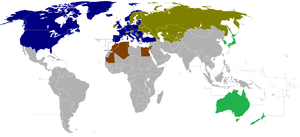Accession of Bosnia and Herzegovina to NATO
The accession of Bosnia and Herzegovina to NATO (North Atlantic Treaty Organization) has been under negotiations since 2008.
 |
|---|
| This article is part of a series on the politics and government of Bosnia and Herzegovina |
|
|
Recent elections |
|
|
|
Bosnia and Herzegovina joined the Partnership for Peace program of NATO in 2006, and signed an agreement on security cooperation in March 2007.[1] The nation began further cooperation with NATO within their Individual Partnership Action Plan in January 2008.[2] Bosnia then started the process of Intensified Dialogue at the 2008 Bucharest summit.[3] The country was invited to join the Adriatic Charter of NATO aspirants on 25 September 2008.[4] Then in November 2008, a joint announcement from the Defence Minister and the NATO Mission Office in Sarajevo suggested that Bosnia and Herzegovina could join NATO by 2011 if it continues with the reforms made in the defence-area so far.[5]
In January 2009, Defence Minister Selmo Cikotić again confirmed Bosnia's interest in seeking a Membership Action Plan (MAP) at the 2009 summit, with membership by 2012 at the latest.[6] In February 2009 The Defence Minister of BiH Selmo Cikotić presented some poll numbers on NATO-membership: 70% of the country supports NATO-membership; however while 89% of the Federation Entity supports NATO-membership, only 44% in the RS-entity did. While the country did not receive an MAP at the April 2009 summit in Strasbourg–Kehl, Stuart Jones, an official of the US State Department, said on a September 2009 visit to Bosnia and Herzegovina that NATO was going to look at the possibilities for them to receive one in a December 2009 summit, repeating strong US support for the possibility. Then on 2 October 2009, Haris Silajdžić, the Bosniak Member of the Presidency, announced an official application for Membership Action Plan (MAP). On 22 April 2010, NATO agreed to launch the MAP for Bosnia and Herzegovina, but with certain conditions attached.[7] Turkey is thought to be the biggest supporter of Bosnian membership.[8]
Bosnia and Herzegovina has yet to fulfil the condition to launch an Annual National Programme under its MAP: the transfer of the registration of 63 military facilities from the local level to the central government.[9][10] As of November 2018, 33 have been fully transferred, all of which are located in the Federation of Bosnia and Herzegovina.[11][12] The Republika Srpska (RS), the Serbian political subdivision of Bosnia, has opposed the move and refuses to transfer the 23 properties located in its territory. A Bosnia court has ruled that it must transfer the military facility in Han Pijesak in RS to the Bosnian government.[13] This was upheld by a ruling of the Constitutional Court of Bosnia and Herzegovina on 16 August 2017.[14]
Despite that all immovable property is not fully registered, NATO approved the activation of the Membership Action Plan for Bosnia and Herzegovina, and called on Bosnia to submit an Annual National Program on 5 December 2018.[15] On 17 December, United States Deputy Secretary of State John Sullivan stated the United States supports Bosnia and Herzegovina's bid to join NATO, and dismissed Serb objections by adding that "Washington would react strongly to any threat to the stability of the country".[16] The submission of a MAP Annual National Program was delayed due to a veto by Milorad Dodik, the Serb member of the Bosnian Presidency.[17] The issue also prevented the formation of a government following the 2018 Bosnian general election.[18] On 19 November 2019, as part of a broader deal on government formation, Dodik agreed to a Reform Program which would be sent to Brussels.[19] However, there is disagreement on whether this Reform Program is actually an Annual National Program under NATO.[20]
The 1995 NATO bombing of Bosnia and Herzegovina targeted the Bosnian Serb Army and together with international pressure led to the resolution of the Bosnian War and the signing of the Dayton Agreement in 1995. Since then, NATO has led the Implementation Force and Stabilization Force, and other peacekeeping efforts in the country.
Negotiation progress
| Event | Date |
|---|---|
| Partnership for Peace | 2006-12-14[21] |
| Individual Partnership Action Plan | 2008-09-10[22][23] |
| Intensified Dialogue | 2008-04-03[24] |
| Membership Action Plan | 2018-12-05[25][Note 1] |
| Invitation to join | |
| Accession protocol | |
| Treaty in force | |
| Full membership | |
Ratification process
- Originally invited to join the MAP in April 2010 under the condition that no Annual National Programme would be launched until one of the conditions for the OHR closure – the transfer of control of immovable defence property to the central Bosnian authorities from the two regional political entities – was fulfilled.[7] Condition waived in 2018.
See also
References
- "Bosnia, NATO sign security deal". B92. 19 March 2007. Archived from the original on 7 June 2011. Retrieved 22 September 2008.
- "NATO approves BiH's pre-membership action plan". SETimes.com. 11 January 2008. Retrieved 15 September 2008.
- "Bosnia hopes to join NATO by 2015". AFP. Haaba. 27 December 2007. Retrieved 20 September 2008.
- Avaz, Dnevni (26 September 2008). "BiH, Montenegro invited to join Adriatic Charter of NATO aspirants". Southeast European Times. Retrieved 7 October 2008.
- Numanović, S. (12 November 2008). "BiH ulazi u NATO 2011. godine?". Dnevni avaz (in Bosnian). Retrieved 12 November 2008.
- Fena (1 January 2009). "Posljednji korak ka punopravnom članstvu". Dnevni avaz (in Bosnian). Archived from the original on 3 January 2009. Retrieved 1 January 2009.
- "Bosnia gets Nato membership plan". BBC News. 22 April 2010. Retrieved 22 April 2010.
- "BiH dobila zeleno svjetlo za MAP" [BiH got green light for MAP]. Radio Slobodna Evropa. 22 April 2010. Retrieved 27 July 2020.
- Stiglmayer, Alexandra. "Work in progress: Bosnia 20 years after Dayton". NATO.
- "NATO rules out admitting new members anytime soon". Fox news. Retrieved 7 July 2014.
- Lakic, Mladen (14 November 2018). "Bosnian Minister Floats Hopes of Progress Towards NATO". Retrieved 7 March 2019.
- "54th Report of the High Representative for Implementation of the Peace Agreement on BiH to the Secretary-General of the United Nations". High Representative for Bosnia and Herzegovina. 6 November 2018. Retrieved 7 March 2019.
- Kovacevic, Danijel (23 November 2016). "Bosnian Military Property Dispute Bars Way to NATO".
- Kovacevic, Danijel (16 August 2017). "Court Rejects Bosnian Serb Claim to Army Facilities". Retrieved 18 August 2017.
- Lakic, Mladen (5 December 2018). "NATO Approves Membership Action Plan for Bosnia". Balkan Insight. Retrieved 5 December 2018.
- Sito-Sucic, Daria (17 December 2018). "U.S. backs NATO membership for Bosnia, dismisses Serb opposition". Reuters. Sarajevo. Archived from the original on 17 December 2018. Retrieved 28 December 2018.
- "Bosnia as the new 'battleground' between NATO and Russia". Al Jazeera. 7 July 2019. Retrieved 14 July 2019.
- "Council of Europe Assembly to Suspend Bosnia's Membership". 24 June 2019. Retrieved 14 July 2019.
- Kovacevic, Danijel (21 December 2019). "'Reform Program' Fails to Clarify Bosnia's NATO Ties". Retrieved 22 December 2019.
- "Dodik: adopted BiH's Reform Plan does not represent the Annual National Plan for NATO". 19 December 2019. Retrieved 22 December 2019.
- "Signatures of Partnership for Peace Framework Document". NATO. 10 January 2012. Retrieved 9 February 2015.
- "Individual Partnership Action Plans". NATO. Retrieved 13 November 2013.
- "NATO's relations with Bosnia and Herzegovina". NATO. 17 June 2014. Retrieved 5 June 2015.
- "Nato Macedonia veto stokes tension". BBC News. 4 April 2008. Retrieved 5 February 2015.
- "NATO Approves Membership Action Plan for Bosnia". balkaninsight.com.
.svg.png)
